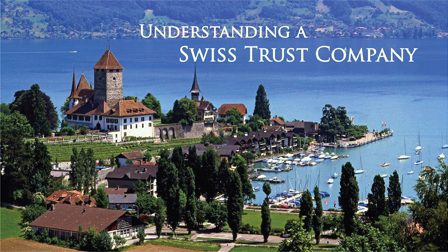
“UNDERSTANDING A SWISS TRUST COMPANY”
Older Swiss Trust Companies (STCs) continue to be in much demand. Unfortunately, it seems that this demand has created a flood of information on the internet which can be confusing and seemingly at times contradictory. It is after all the internet and anyone can post anything. The realities, however, of how an STC comes into existence and then becomes available for resale are not that complicated. We offer you the following synopsis as a brief yet encompassing explanation.
To explain a Trust Company you must start with the concept of a “captive.” Captives are typically vehicles to bring critical financial functions in house. Those functions could be insurance, banking or brokerage. These entities have been frequently misunderstood or abused as tax shelters but there are virtually no remaining tax benefits. The direct benefits are: 1) Cutting corporate costs 2) Control of moving capital and therefore preserving business opportunity or 3) Asset protection for ownership. As such, many of the functions associate with investing and moving capital can be brought under the management of the parent company. For example: A Swiss Trust Company is often utilized as an excellent alternative to private bank ownership among its many other benefits.
HYBRID CORPORATE ENTITY
A Swiss Trust Company is hybrid corporate entity that will likely have its origins as a Family Trust or an IBC many years ago. Most are dormant and the previous activities are of little or no consequences since there are no assets or liabilities. What is of importance is that at some point the entity went through a conversion to a Non-Banking Financial Institution. All Swiss Trust Companies are established by taking an older corporate entity, renaming it, changing the articles of association and then finally getting approval from the appropriate Swiss Canton. This is a very detailed process that can take several months of filings and work. Again, the previous activity has no bearing on the current capabilities of the entity but the age of the entity is of extreme importance which is explained in some detail later. All Non-Banking and Banking Corporate Entities throughout the world follow a similar process and start initially as a corporation. It is important to note that this entity cannot be referred to as a bank; it is not a tax shelter nor is it a means to circumvent the banking laws of any country. It is, however, one of the fastest and most cost effective alternatives available to entrepreneurs with international interests that need to bring vital financial functions in house.
Swiss law can seem vague when it comes to Trust Companies and is done so on purpose. In general, the Swiss prefer self-regulation when possible. To that end, a Private Swiss Trust Company in Switzerland is a self-regulated privileged entity (not regulated by FINMA which oversees banks and brokerages). If your corresponding bank accounts are located in Switzerland than after reaching certain levels an additional SRO (Self Regulating Organization) designation and membership http://en.wikipedia.org/wiki/Self-regulatory_organization may be required for the Trust Company. This is usually at the 10-20 client level or CHF10 million in managed assets and can easily be handled by a qualified administrative firm.
COSTS TO ACQUIRE OWNERSHIP
The typical cost range to acquire ownership of a Swiss Trust Company is USD$55,000 to USD$175,000. In rare instances it may be slightly lower. The good news for buyers is that with the recent global economic crisis prices have significantly come down literally saving thousands of dollars. This required initial investment outlay varies according the age of the structure. As a rule of thumb, the older Trust Companies are more appropriate for clients who wish to make it a working Non-Banking Financial entity. If a client, however, is looking to benefit from owning a Swiss Trust Company solely for asset protection a younger company would be more appropriate and thus require a smaller investment. A bearer share Swiss Trust Company is an excellent vehicle to protect privacy.
WHEN NEW IS NOT BETTER
As previously stated age is tremendously significant and can provide distinct advantages when establishing corresponding banking relationships, going public with an IPO or acquiring a SWIFT membership. In all of these cases the older the better and with a minimum of 10-20 years of age normally being required. It would be extremely difficult if not impossible to work with a younger Trust Company to accomplish these goals. In fact, it has been our experience that most highly regarded Swiss administrative firms will not work with extremely young STCs.
CONCLUSION
A Swiss Trust Company is a very unique entity. It brings together the culture of the Swiss in promoting self-regulation and privacy with a functioning entity that can be utilized for asset protection, estate planning or as an alternative to private bank ownership. STCs are also extremely inexpensive when compared to the time and money that would be spent elsewhere attempting to acquire either a bank or a trust company. All things considered, there may not be a comparable corporate structure in the world.
Questions? Email your question or requests for more information to:
Jeff Corbett at jcorbett@corb7.com
Corb7 International Inc.
Offering more than 20 years of experience in international acquisitions



